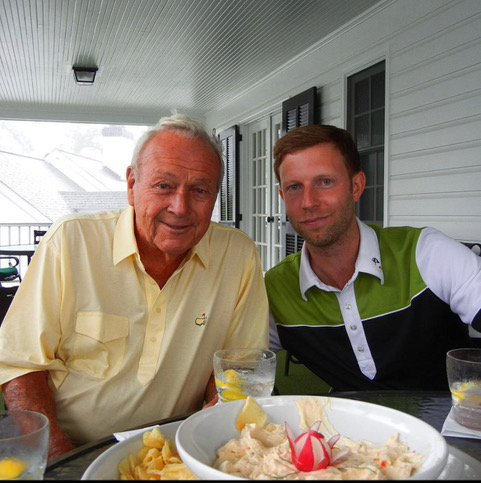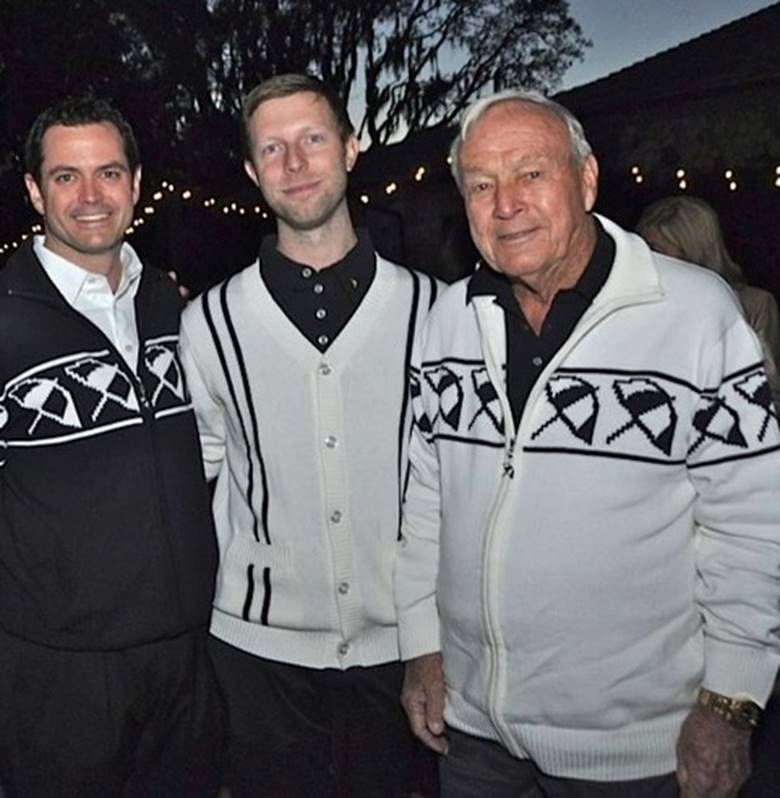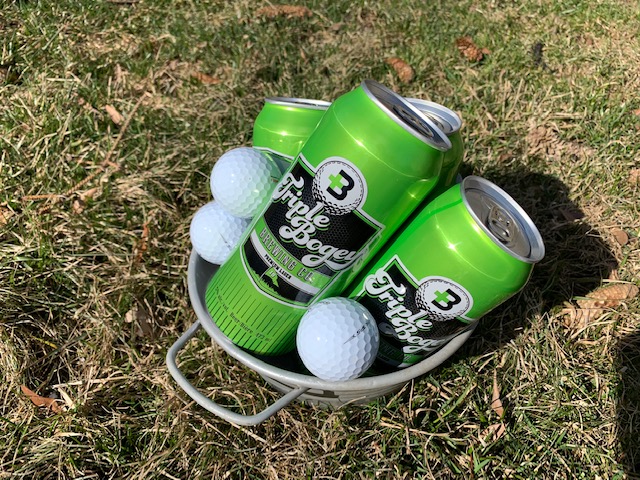
The PGA Tour has produced its fair share of descriptive nicknames, some lifted from the animal kingdom: Tiger, Walrus, Goose, Golden Bear, and the Great White Shark. Others were heraldic: The Squire, and The Black Knight. But only one was pure royalty.
Arnold Palmer (1929-2016) is still “The King.”
The irony is this: in his decade of dominance on the PGA Tour (1955-65), he was equal parts king and commoner, the everyman pro – a strong-armed, blue-collar, super shot-maker who pulled his homemade swing and magnetic personality straight from the Pennsylvania dirt.
This son of a poor golf course superintendent from Latrobe scored his first win at the ‘55 Canadian Open. This proved the aperitif to 61 more, including seven Majors, and four Green Jackets. He optimized his rakish good looks and ‘Go-for-Broke’ playing style (the title of his biography) to become the world’s most bankable superstar.
Few athletes ever owned a sport like Palmer owned golf, and with the rise of its business side, the game needed a new way of benchmarking itself. A flurry of economic impact studies was prepared, measuring the GNP of the sport. In Canada, the National Allied Golf Associations (NAGA) published its first industry data this century, which showed its standing among other industry sectors. This was a lobbying tool, and way to up its standing with the powers that be on Parliament Hill. It has now inched towards the $20 billion mark.
To many who cover the sport, The King remains the source of the golf industry Nile.
Forbes estimates his fortune at $875 million, third of all-time for athletes behind Michael Jordan and Tiger Woods. But remember this: Palmer was first; he created the mold.
He was the greatest pitchman since Barnum, selling everything from Pennzoil to Cadillacs and L&M cigarettes. The International Management Group (IMG) began in 1960 to piggyback off his popularity – and his Hollywood handsome visage. A new business sector (sports marketing) emerged because of him, and in the first year of the IMG-Palmer partnership, the golfer’s per-year, off-course earnings jumped from $6,000 to $500,000.
Arnold Palmer Enterprises still hauls in hundreds of millions each year, and its late founder registers in the top-three in a cryptic sub-sector: money-earned-by-deceased-celebrities. He tops another king, the hunka hunka burning love now buried at Graceland.
Today, his image is on an iced tea and lemonade beverage that sells over half a billion units each year.
Which brings our ship to shore, and the real subject of this story: Geoff Tait, a Toronto-based entrepreneur. He has been a major player in the Canadian golf industry for more than a decade, and is one of the favoured few who had the good fortune to call The King his mentor, partner and friend.
Brewing up a new business model
Tait’s a lanky, good-natured, 43-year-old father of two and founder of Triple Bogey Brewing Company, a made-in-Canada success story that began in 2013 and serves directly the golf industry, making it one of the most targeted and progressive beer makers on the planet, maybe the first of its kind in North America.
Last month, I visited his tiny head office in the fashionable Beaches area of east-end Toronto. My journalistic connection to him spins back to 2008 when, after co-founding Quagmire Golf apparel in ‘05, he was making serious headway as one of the foremost “lifestyle brands” in golf – a line that transformed easily from on-course to off, and vice-versa. That’s when I got to interview him, write a story, pull on one of his polos.
Tait was cool. Quagmire’s apparel line was “chill.”
In 2008, the firm was touched by the magic hand of chance. It offered a modest fee to young pro Chez Reavie to wear its clothes on tour, and a few months later, the Arizona no-namer scored an upset win at the Canadian Open. This vaulted Quagmire into the big leagues, and two years later, it fell under the watchful eye of Jim Neish, the sports licensing executive for IMG Canada who played a leading role in its business development across the continent.
Arnold Palmer (AP) apparel was a fusty mess, in desperate need of a serious re-do. It needed to bust out of the constraints which fed its products to an aging-out demographic of old, white, males.
Tait believes there are no coincidences in life, it’s all about fate, happenstance, and something Jung called synchronicity. How else can we explain the pairing of AP and Quagmire?
It happened like this: In 2010, Neish called Tait and asked if Quagmire was interested in a potential partnership and licensing agreement? Could they create a product line that captured the fancy of a new generation? Tait thought it was a prank call and went to hang up, but something stopped him… Neish dropped the Palmer name.
The call ended with a promise: if Quagmire developed a new line, Neish would set up a showing with the Palmer people at IMG headquarters at the Tournament Players Course (TPC) near Jacksonville.
The Quagmire team stitched together a few ideas, and Tait travelled to Florida. He decided to model the clothes himself. When he arrived at the meeting in shorts, polo and sneakers, he was surrounded by a sea of suits.
The line was alt-everything: blacks and whites and muted shades of grey. Even the famed multi-coloured AP umbrella (the company’s logo) was reworked in b&w.
The suits loved it!

The King and his court
Another meeting was planned, this time in the rolling hills of Pennsylvania, at Latrobe Golf Club, the company headquarters. The King would be there to sign off on any deal.
When Tait arrived, he was given the royal treatment: a round of golf; a walk through the famous barn filled with Palmer memorabilia; a stay in a lovely on-site guest house; and a chance to rummage through The King’s closets and get a feel for his taste in clothing.
Tait was nervous as hell as he entered the meeting, but followed the Florida script to a tee, with one notable change: he sported the hipster look – gritty and unshaven. He didn’t know Palmer was a stickler for tradition, and hated facial hair. Despite this misfire, The King loved the line, and gave it his famous thumbs up.
Tait was so overjoyed he breeched royal protocol and wrapped The King in a big bear hug. After squirming free, and laughing heartily, Palmer told his new partner to buy a razor.
The ‘Arnie’ line was an aesthetic and financial success. High-end retailers jumped on board. Tony clubs like Pebble Beach stocked it on their shelves. Quagmire got to stick its nose into the international marketplace.
The day-to-day activities of AP Enterprises were run by Cori Britt, vice-president/brand manager, and Amy Saunders, daughter to The King, and a keeper of the family’s iconic brand-name. Both become Tait confidants.
The young Canadian was overwhelmed by the perks that followed: trips to Latrobe, golf at Bay Hill (the firm’s southern headquarters), and cocktail parties where his family met The King and his courtiers. One day, he jumped a flight to The Masters and lunched with “Mr. Palmer” on the veranda of Augusta National. Jack Nicklaus wandered by and gave him a good-natured slap on the shoulder. “So, you’re the new apparel guy,” he said.
It was dizzying, life-altering. He traded-in his sedan for a BMW. He played with an AP executive at the ultra-exclusive Pine Valley golf course in New Jersey. His reputation spread so far and wide he was recruited by hip-hop star Kanye West to help him retail his new apparel line (which went nowhere). At one meeting, Tait sat between John Legend and Jay-Z.
Rise of the back-shop boy
This was heady stuff for someone who cut his teeth in the golf business as a 12-year-old back-shop boy at St. Thomas Golf & Country Club. His interest in apparel manifest itself in high school when he and friend Dan Axford (now director of instruction of Vancouver’s McCleery Golf Academy) sold hats and t-shirts. He studied golf management at Humber College, then slipped anchor to teach golf on cruise ships. He ended up Down Under where he attended university and did a side-hustle at Bondi Beach in Sydney, selling duds to surfer dudes. This led in a perfect line to Quagmire, then Palmer.
But by late 2012, red flags were flying. Tait failed to heed the age-old warning: when everything seems simpatico, danger lurks. Quagmire’s internal executive dynamic was collapsing. The day the firm imploded, he had to turn down a $750,000 order for more ‘Arnie’ stuff.
Tait grimaces when recalling those tumultuous economic times, but skips forward to explain what happened next: after the dissolution, came a long bout of depression. He drank himself stupid. He could hardly get out of bed. When he did, it was to a fill a part-time gig as a lecturer at a community college. He admits to arriving for morning classes with booze on his breath. His mood was black, and his outlook blacker. Gone were the struts and brags of being a company owner, the trips south, the cocktail parties, golf at the posh clubs, and worst of all, the loss of his friendship/mentorship with The King. He traded in the BMW for a small sedan.
Tait was nearly broke – financially, and in spirit. His wife Megan, a marketing executive, asked him to buck up and remember all his bona fides as a businessman: boldness, confidence, and creativity. She said, “you came up with one great idea (Quagmire), why not another?”
This was his George-Bailey-at-the-bridge moment when he realizes no man is a failure who has friends. Why not lean on those business associates he served so well when Quagmire was on the ascendency?
His name still had currency, and the welcome mat was laid out, giving him an opening to pitch his product to food and beverage managers. Triple Bogey was a hit, and they thirsted for more. The brewery started slowly with Tait in control of sales. He and Megan used a panel truck to deliver beer. Since 2014, it has grown by gradations and now has five salesmen and multi-millions in sales.

The new venture is Quagmire-like – brash and bold. It borrows heavily from Palmer’s go-for-broke style. Tait’s grimace is now a smile as he explains the firm’s success. “Nobody,” he says, “had ever targeted the golf world directly, especially the big-name breweries. Why not me?”
It now serves over 400 golf clubs, courses, indoor facilities, bars, restaurants, and LCBO/grocery locations in Ontario. The original blonde lager, light, and amber have now reached into Quebec and Alberta markets, and in all cases, demand outpaces expectation. The product also includes a hard seltzer called ‘Hurry Hard’, an amber lager that is dedicated to the curling crowd. The newest offering is a half-and-half (lemonade and iced tea) that is, well, an indirect tribute to the man from Latrobe.
The King’s ongoing presence
The King died in 2016 and Tait was gutted. Those “magical” moments came flooding back. He told Megan they had to drive to Pennsylvania and pay homage, even if they didn’t have tickets to a memorial service that would draw a who’s who of the golf world.
Says Tait: “I just had to give someone a hug.”
Britt and Saunders, his key Palmer people, learned of his plans and made sure two tickets were left for the service and a special dinner afterwards. If Tait needed proof that AP Enterprises still held him in high regard, this was it.
Our interview is over. Tait is eager to back to his cellphone and sell more suds. But he is still bursting with stories. I ask him for one more, his favourite Arnie moment. It goes something like this: He was in an overcrowded room in the Augusta National clubhouse when Mr. Palmer pulled him aside and directed him to a quiet corner. They talked privately for over half-an-hour. The subjects ran the gamut: apparel, the golf business, family and friends, and finally, life itself. It was a moment in time that Tait still savours. Sometimes, he says, he has to pinch himself in knowing he once called The King a partner, mentor, friend.
Palmer once stated that there was no such thing as a King of golf. The world disagreed. This is why Tait so cherishes his time with him, especially that lunch at Augusta National. The picture of them hangs on the wall over his desk at the Toronto office. It gives him inspiration and solace, especially during the tough days when the pressure of growing a business leaves many entrepreneurs lost and searching. It’s as if The King is looking over his shoulder, guiding him, urging him on.
Buried within the latest NAGA numbers are Triple Bogey’s ever-expanding profit figures. What isn’t shown, is how the company got there, and how much the ‘Arnie Factor’ helped inspire Tait to grow his business from the ground up.
Palmer and Tait were an odd mix, divided by personality, nationality, and generations. But their partnership/friendship/mentorship never felt strained, just endearing and enduring.
To Palmer, every deal was built on trust, and sealed with a handshake.
Tait follows The King’s lead – but with one exception.
His deals end with a hug.
Rick Drennan is senior writer/columnist with Pro Shop magazine and Golf Industry Network. He can be reached at rickdrennan51@gmail.com











